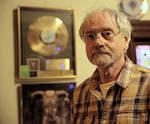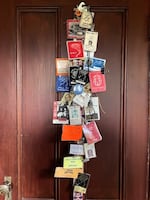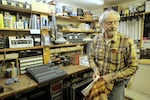
Portland sound engineer Dennis Darby has a copy of the Eagles' gold record for "One of these nights."
Kristian Foden-Vencil / OPB
Dennis and Melissa Darby went to see the new Bob Dylan biography “A Complete Unknown,” when it opened on Christmas.
They enjoyed the film, particularly the scene in which Joan Baez and Bob Dylan sang together at the Newport Folk Festival. The biopic moment sent Melissa to the internet as soon as she got home. And after a few clicks, she found the moment she’d been looking for: A video of her husband, much younger, on stage with Dylan and Baez.
“I set the microphones so their acoustic guitars could be heard,” Darby said.
The image was from the 1982 Peace Sunday music festival in Pasadena, California — just one moment from Darby’s long, wild career in helping some of the biggest artists in the world reach their audiences.
Darby started his sound career in junior high with his friends in Seattle in the early 1960s.
“We were into electronics, so we built radios. We built amplifiers,” Darby said. “We built illegal FM transmitters so we could talk to each other from our houses.”
Using money from his paper route, Darby bought microphones, mixers and kits to build amplifiers and speakers. He and his friends would help put on plays at high school by setting up the sound system, lights and projectors.
It was the Summer of Love, and pop concerts were becoming big business. A Seattle promoter heard about the friends and asked if they could set up the sound system at one of his concerts.
“It was called the Trips Lansing festival of 1967. And we did Sonny and Cher, Moby Grape, Ural Thomas, Marrilee Rush, Paul Revere and the Raiders, 5th Dimension, Glen Campbell,” he said.

Dennis Darby's collection of concert badges hangs in his office at his house in Northeast Portland, Dec. 27, 2024.
Courtesy of Dennis Darby
Darby loved making the microphones and speakers work properly and seeing all the bands.
Promoters in Seattle revived the Eagles Auditorium, and Darby ran the sound system for some of the biggest acts of the era, including Janis Joplin, Muddy Waters and Donovan. He also made personal recordings. He wanted the best quality possible, so he put microphones on everything. In the 1960s, sound engineers usually just miked the singers.
“We had guys like the Grateful Dead and the Doors show up and say: ‘Why do you need to mic the drums?’ And ‘Why do you need to mic the amplifiers and stuff? Aren’t we loud enough?’”
It wasn’t about how loud they were; putting a microphone on everything gave the operators a way to mix and balance the sound.
“The recording studio kind of came to the concert stage,” said Rick Chinn, who worked with Darby at the time.
This was during the Vietnam War. Just as Darby’s career was starting to take off, he was drafted. But in a stroke of luck, he was sent to Europe instead.
“My life story is I missed Vietnam by a week,” he said. He worked on military radios and other electronic equipment, honing his skills, for two years in the military.
When he returned to civilian life, he helped a local Seattle musician build a sound system for touring groups. They set up systems for Aretha Franklin, the Bee Gees, Chuck Berry, Earth, Wind & Fire, Fleetwood Mac, Miles Davis, The Who and The Eagles.
In the early 1970s, Darby moved to Portland with a friend to engineer for Northwest Sound, a sound system company run by Bob Sterne.
They developed state-of-the-art systems for massive concerts and toured across the United States and internationally.
“You would wake up in the morning, you’d come out of your hotel, get into your rental car, you’d drive to the airport, get on a plane, get off the plane. Get another rental car. Drive to the hotel. Drive to the venue, set it up, do your show, put it back in the truck. Go back to the hotel, sleep, get up in the morning and do it all over again,” he said.

Dennis Darby still works on sound engineering equipment in his home workshop. Northeast Portland, Dec. 27, 2024
Kristian Foden-Vencil / OPB
On tour, Darby got to know some of the musicians, particularly the members of Crosby, Stills, Nash & Young.
“We hung out with the bands,” he said. “There were artists that didn’t do that. And one of them was Bob Dylan. He would be one that you couldn’t hang out with.”
After a life of touring, Darby started his own business in Portland making things like speaker cabinets and microphone booms, employing up to 35 people. He’s now retired, living in a big old farmhouse in Northeast Portland.
